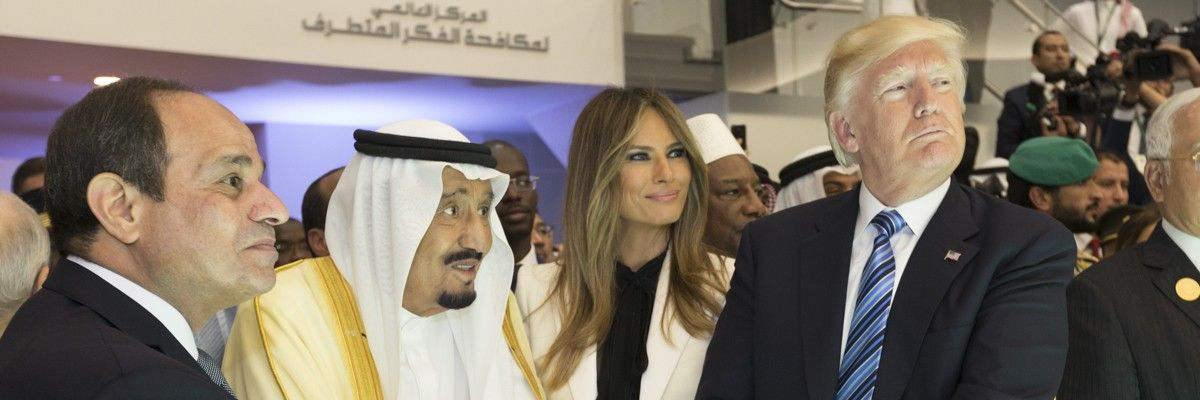Headline after headline has been coming out about attacks on American democracy by Middle Eastern states — and most of them are purportedly America’s friends.
An Israeli security firm may have spied on U.S. officials. The United Arab Emirates cultivated a Trump adviser to influence administration decisions and even insert pro-UAE language into a Trump speech. Egypt pushed the U.S. government to jail an Egyptian-American activist. Iran wanted to kidnap a dissident from New York.
The revelations are only the latest in a series of attempts by Middle Eastern states to subvert American democracy. In recent years, Saudi operatives murdered a Washington Post journalist, and the Turkish presidential guard physically attacked American protesters in Washington DC itself. Most of these malign influence campaigns are coming not from America’s avowed enemies, but from its allies and partners in the region, many of which receive generous U.S. support. Eighteen years after promising to spread democracy in the Middle East, the United States is now paying Middle Eastern autocrats for the privilege of undermining its own democracy.
The past few decades of U.S. wars in the Middle East have given the region’s powers a particularly strong incentive to influence American politics. While strong institutions govern U.S. policy towards Europe and East Asia, the long U.S. campaigns in the Middle East have been marked by shifting tactical alliances, often steered by a small group of American policymakers. Meanwhile, these states have found creative ways to use money to shield themselves from criticism.
U.S. alliances in Europe and East Asia are institutions, governed by Senate-approved treaties. Of course, states like South Korea and Japan can and do try to lobby for a better deal around the margins, but it is hard to change the terms of the relationship without serious political momentum. By contrast, the U.S. relationships in the Middle East are held together mostly by military bases and weapons sales. And as Saddam Hussein learned the hard way, U.S. attitudes towards a state can shift very quickly.
At the same time, there is very little democratic oversight over U.S. policy towards the Middle East. The massive U.S. military machine operating there is mostly background noise in American politics. Instead of popular debate, U.S. policy towards the Middle East is steered by a few policy wonks in Congress and the executive branch, operating in an ecosystem of niche journalists, think tank researchers, and single-issue activists.
This political environment means that cajoling or convincing a few individuals in America can exert a huge effect on the Middle Eastern balance of power. Most foreign influence-peddling does not look like outright bribery and threats. Instead, foreign powers pump money into think tanks and academic institutions, incentivizing these organizations to publish the right kind of research and promote the right experts — who then go on to talk to journalists, advise policymakers, and land government jobs.
However damaging it is when countries like Russia and Iran carry out hostile influence campaigns, the influence operations of friendly countries strike much closer to the heart of American democracy.
Outsourcing foreign policy to kings and autocrats means surrendering democratic control over America's future. The U.S. Constitution gives Congress the power to declare war and sign treaties because these are some of the most serious decisions a country can make. Yet the current political environment allows Middle Eastern leaders to get inside the foreign policy process. The seemingly minor decisions these leaders promote eventually add up — and have already landed the United States in a near-war with Iran that the American public has never seriously debated.
The downsides of foreign influence don’t end with distorting foreign policy. When another country “basically runs whatever area of DC that it considers part of its interests,” as one expert observer put it, it shows “how utterly corrupt the place is.” If a foreign power creates a back door into American politics, other powerful interests will try to use that door for their own purposes, or take notes on how to carve out their own door.
The most immediate way to reverse the rot is to impose democratic safeguards over foreign policy-making. The Senate is currently looking at a bipartisan bill that would tighten the president’s war powers and require a congressional vote for weapons sales to foreign countries. While Congress isn’t perfect, compromising 535 members is a much more daunting task than just getting the President’s ear. The more say the American people have over foreign policy, the harder it is to corrupt the process.
But in the long run, taking back popular control of the U.S. government requires dropping its addiction to foreign wars. As long as the United States acts as the 500-pound gorilla in the Middle East, the region’s states will try to influence its actions. If Americans want normal politics, they need a government that acts like a normal nation.
















